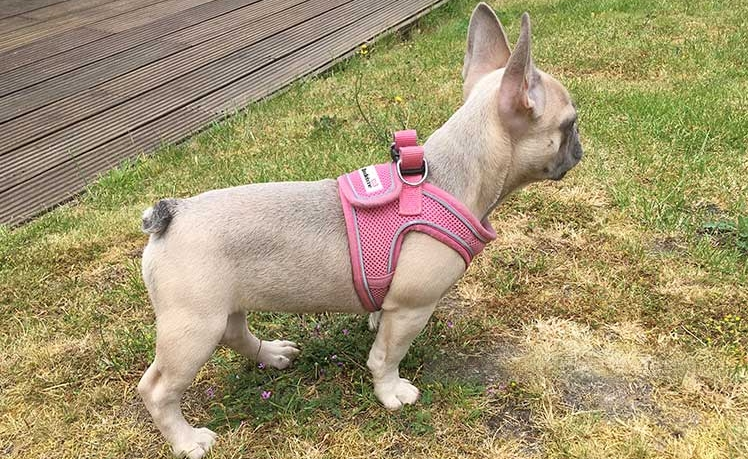As a new owner of a French Bulldog puppy, you may wonder how much to feed them. Their unique dietary needs must be addressed with care and due diligence to ensure your pup receives the right nutrients for their age, weight, activity level, and overall health and well-being. In this article, we will explore how much to feed your French Bulldog puppy, when and how often they should be fed, and what types of food best suit their needs. Doing so guarantees your French Bulldog an enjoyable life with the proper nutrition they need. So let’s start and discover what it takes to keep your Frenchie happy and healthy.
Understanding the Nutritional Needs of French Bulldog Puppies
Known for their unique physical structure, French Bulldogs have a broad chest, short snout, and muscular build, typically weighing 16-28 pounds. Due to this body shape, they have distinct dietary requirements which must be addressed to ensure the health and happiness of your Frenchie. Providing them with the right nutrients and foods is essential for keeping your pup healthy and active.
Protein is a key nutrient for French Bulldog puppies, aiding in the development and repair of their muscles. It’s also important to provide your pup with enough fat in their diet to give them energy and help with brain development. Carbohydrates are equally essential, supplying energy and fiber for healthy digestion. Combining these nutrients will ensure that your puppy receives all the nutrition they need throughout its growth stages.
When selecting puppy food for your French Bulldog, look for high-quality brands that contain natural ingredients, vitamins, and minerals. Avoid brands that contain fillers, artificial preservatives, and low-quality proteins such as meat by-products.
It’s also important to ensure your French Bulldog puppy gets enough water. They always need access to clean water to stay hydrated, especially during hot weather or after exercise.
Factors that Determine How Much Your French Bulldog Puppy Should Eat
When it comes to feeding your French Bulldog puppy, the amount of food they need will vary depending on their age, weight, activity level, and metabolism. Puppies typically need more sustenance than adult dogs while growing and developing. It is generally advised that puppies have three to four small meals a day until they reach six months old and then switch to two meals per day afterward. A balanced diet and the correct food quantity will help ensure your pup gets all the nutrients needed for optimal health. As a general guide, pups should consume around 25-30 calories per pound of body weight daily. Providing the right quantity and quality of food is key to ensuring your pup lives a healthy and happy life.
When determining the exact amount of food to give your French Bulldog pup, it is important to consider their age and weight. For instance, a 2-4 month-old puppy that weighs 5-10 kg may need approximately 1/3 cup of food three times a day. On the other hand, an older pup aged 6-12 months weighing 15-30 kg may need 1 to 1 1/2 cups of food twice daily. You can ensure they grow strong and healthy by providing the right quantity and quality of food based on your puppy’s needs.
When feeding your French Bulldog puppy, it is essential to adhere to the recommended instructions on their food’s packaging. Additionally, it is a good idea to monitor their weight regularly. Too rapid or too slow of weight gain may indicate that you need to adjust the amount of food you are getting accordingly. By following these steps, you can ensure your puppy remains healthy and hits their growth targets.
Recommended Types of Food for French Bulldog Puppies
When choosing food for your French Bulldog puppy, choose a high-quality brand containing natural ingredients, vitamins, and minerals. Steer clear of brands that include fillers, artificial preservatives, or low-quality proteins such as meat by-products.
Dry kibble is a frequent choice for French Bulldog puppies as it aids in keeping their teeth clean and can be convenient for pet owners to manage. When selecting dry kibble, make sure it is specially formulated for puppies and contains high-quality proteins like chicken, turkey, or fish. Alternatively, wet food is also an option – particularly for puppies who have difficulty chewing dry kibble – and should include proteins such as chicken, beef, or lamb.
Raw diets are becoming more common among pet owners, consisting of uncooked meats, bones, fruits, and veggies. While there may be health benefits associated with this type of diet, there are also risks like bacterial contamination and nutrient imbalances to consider. Before you switch your French Bulldog puppy to a raw diet, it is recommended to talk to your vet for the best advice on their health.
Tips for Feeding Your French Bulldog Puppy
Offering meals to your French Bulldog puppy can be an enjoyable and rewarding experience. To make the most of feeding times, keep in mind the following tips:
- Opt for a high-quality food bowl that is the perfect size for your puppy.
- Feeding your puppy table scraps or human food could disturb their digestive system.
- Ensure your puppy has access to clean, fresh water at all times.
- Monitor your puppy while eating to ensure they are eating the right amount.
- Consider feeding your puppy smaller meals more frequently to prevent overeating.
Common Feeding Mistakes to Avoid
Owning a French Bulldog puppy can be a rewarding experience – but it is important to ensure they get the right nutrition and avoid any potential health risks. Here are some of the common feeding mistakes to avoid:
- Overfeeding your puppy, which can lead to obesity and other health problems.
- Providing your pup with the wrong type of food resulting in digestive issues.
- Not monitoring your puppy’s weight and adjusting its diet when necessary.
- Establishing an irregular feeding schedule, which can cause overeating and digestive issues.
- Feeding your puppy table scraps or human food, which can be harmful to their health.
The Importance of Monitoring Your Puppy’s Weight and Adjusting Their Diet Accordingly
Monitoring your French Bulldog puppy’s weight is crucial for their health and well-being. Obesity is a common problem among French Bulldogs and can lead to health problems such as joint issues, heart disease, and respiratory problems.
Regularly weighing your French Bulldog puppy is a great way to monitor their growth and development. If your pup is gaining weight too quickly, consider reducing food intake or switching to a lower-calorie diet. On the other hand, if your puppy isn’t gaining enough weight or is losing weight, an increased food intake or a higher-calorie diet might be necessary.
What to Do if Your French Bulldog Puppy is Not Eating Enough or is Overeating
If your French Bulldog puppy isn’t eating enough, it may be due to an upset stomach or simply not enjoying their food. To help them get back on track, explore different food options and add some wet food to the kibble to pique their interest in meals again.
If your puppy is consuming too much food, reducing its intake is vital. That may mean cutting down on their portion sizes, changing to a lower calorie diet, or using a slow feeder bowl to slow down fast eaters. If you notice an unexpected shift in your puppy’s eating habits or other symptoms such as vomiting or diarrhea occur, contact a vet quickly for the best advice.
Conclusion
If your puppy has begun overeating, altering its food intake is necessary. Reducing the amount they are being fed or changing to a diet with fewer calories may be beneficial. Slow-feeder bowls can also help regulate fast eaters. If there has been an unexpected change in your pup’s eating habits and they exhibit vomiting or diarrhea symptoms, don’t hesitate to contact a vet for advice.



